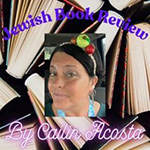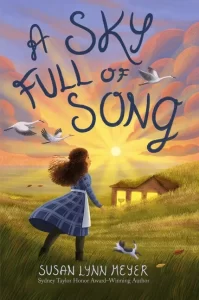A Sky Full of Song by Susan Lynn Meyer; New York: Union Square Kids; © 2023; ISBN 9781454-957553; 263 pages; PJ Our Way

 SAN DIEGO – The year was 1905 and Shoshana, Mama, older sister Libke and twin toddler sisters Pearlie and Tsivia were fleeing persecution and finally got sponsors to bring them to America from Ukraine. Shoshana’s older brother Anshel and Papa immigrated a few years ago to North Dakota to settle land for the family. As the family left Ukraine, Shoshana had to leave her beloved cat Ganef with the neighbors since they had to leave in a hurry and bring just the essentials they needed.
SAN DIEGO – The year was 1905 and Shoshana, Mama, older sister Libke and twin toddler sisters Pearlie and Tsivia were fleeing persecution and finally got sponsors to bring them to America from Ukraine. Shoshana’s older brother Anshel and Papa immigrated a few years ago to North Dakota to settle land for the family. As the family left Ukraine, Shoshana had to leave her beloved cat Ganef with the neighbors since they had to leave in a hurry and bring just the essentials they needed.
When they arrived in New York, Shoshana saved a scared kitten and hid her in her pillowcase on the train all the way to North Dakota and named her Zissel. Mama had no idea Shoshana had hidden a kitten until they arrived at the farm. The kitten came out of the pillowcase when they arrived at the dugout Papa and Anshel had built for them. Papa and Anshel were very happy since the land was full of mice and rats so they welcomed Zissel’s help to keep them away.
The dugout needed to be made into a home, so Mama used some old dresses and unhemmed them to cover the walls and add some brightness to the room. As Mama and the girls tidied up the place, Papa and Anshel worked in the field all day. When they finished decorating, Mama handed Papa the mezuzah from their home in Ukraine and was the finishing touch to making the home theirs. They celebrated by eating potato soup from the potatoes in the root cellar.
Shoshana and Libke had help learning English from Rabbi Hillel in Ukraine but did not speak it very well. When the girls started school, they were in a beginning reading group. Shoshana caught on very quickly and if she had questions, she would ask Anshel what words meant. Libke had a harder time, but they stood up for each other since they were the only Jewish family on the prairie. Shoshana was able to decipher if she was being made fun off and the dislike the community had for their Jewish faith. They were pointedly invited to attend church and townsfolk thought it was wrong to work on Sundays. At the general store in town, they were refused items since they were “Yids” and similarly were treated just like the “Dakota” or Native Americans who at the time were having land taken away from them.
A blizzard was coming into the town and the schoolteacher, Miss Jansen told all the children to head in groups to the closest homes. Shoshana and friend Evie made the trek to Shoshana’s house, Libke had stayed home that day. The snow was piling up and Evie fell into a snow drift. After some digging, Shoshana was able to pull her out. They followed the river and thought they were lost. Suddenly, Shoshana saw the lights of her menorah in the window and knew to make a beeline to the dugout. Evie spent the night and observed as the family lit the menorah for the next night of Chanukah.
During the blizzard, Domino, a horse owned by Clive, the school bully, had ice stuck in his nostrils and was having trouble breathing. Although Shoshana and Clive were not friends, she adored his beautiful horse so risked her safety and brought a bucket of pickle juice that melted the snow due to its salt content.. Clive and Shoshana poured the liquid on Domino’s snout and Domino was able to breathe again. Shoshana performed tikkun olam (help for others) for the sake of the horse and Clive realized maybe being kind to the Jewish family (his family called them Yids) saved his horse’s life. He also came inside the dugout to observe Chanukah with Shoshana’s family as the blizzard had not let up.
This story read like the Jewish version of Little House on the Prairie. I enjoyed all the stories of the family and was also sad to read about the antisemitism and hatred toward Native Americans. This novel received the Sydney Taylor Award and is historical fiction ideal for middle school ages, but I recommend it for all ages.
*
Cailin Acosta is the assistant editor of the San Diego Jewish World.